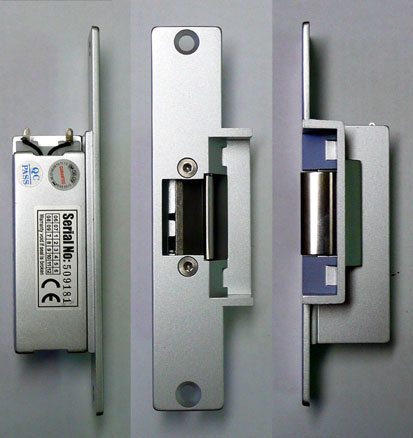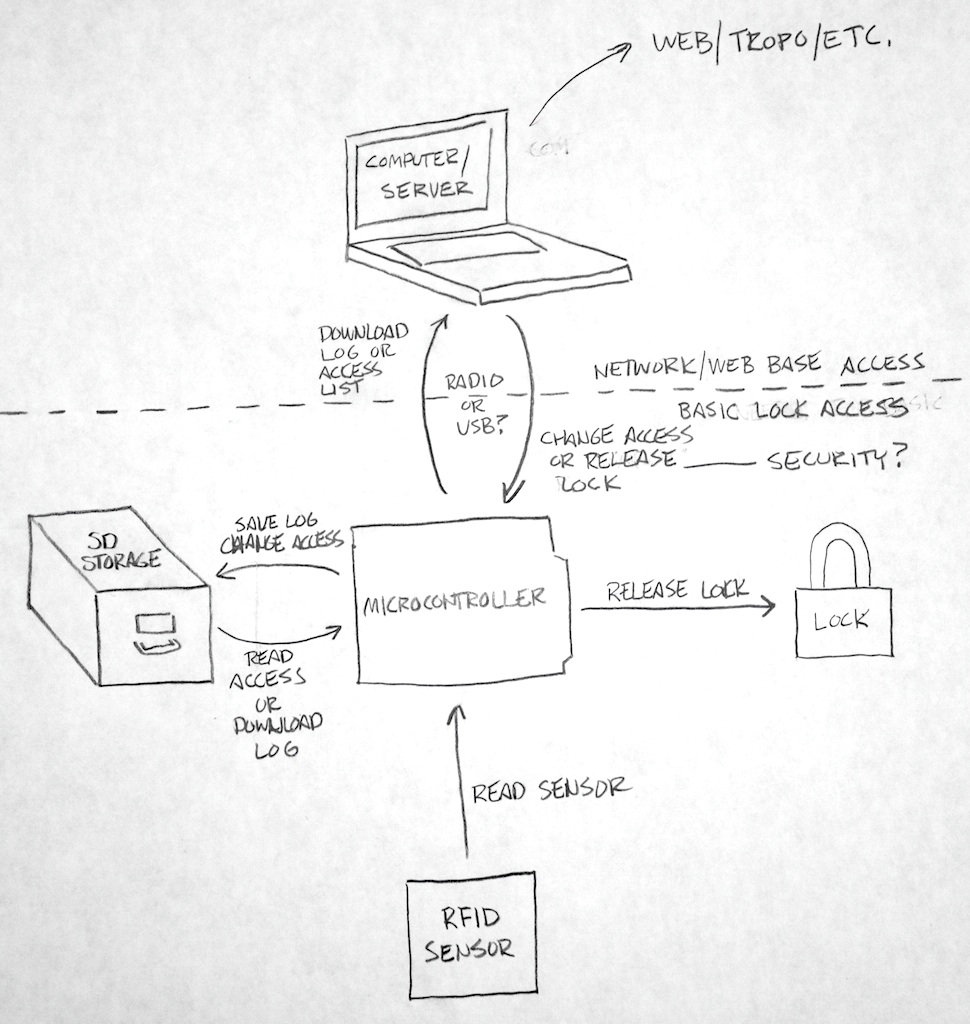RFID door lock: Difference between revisions
Appearance
No edit summary |
No edit summary |
||
| (13 intermediate revisions by 3 users not shown) | |||
| Line 3: | Line 3: | ||
https://256.makerslocal.org/wiki/index.php/USB_Auth | https://256.makerslocal.org/wiki/index.php/USB_Auth | ||
== Required features of Load of Fun lock system == | |||
* Cooperation with Sherwin and the rest of the tenants | |||
* Should be extremely reliable. QA / field testing should be fun. | |||
* Should be extremely simple, require no skills (programming, unix, etc.) to change settings, add or remove access. | |||
* Should cheap enough to replace all artists keys or work with the current lock system | |||
* Should have an option to buzz people in for visitors | |||
* Will be internal requiring access to two doors | * Will be internal requiring access to two doors | ||
== Solutions == | |||
* Jeenodes | |||
=== No Networking === | |||
* Each door has its own microcontroller and reader, stores its own access list ( SD card? ) | |||
* Buzz in system connects directly to lock and uses simple two conductor wire and a button. | |||
* This system limits failure to one door at a time, is very modular. | |||
=== Wireless Networking === | |||
* Jeenodes | |||
** Do they have enough range? | ** Do they have enough range? | ||
*** Read that Jeenodes at 100m line of site or 30m indoors. Lower baud-rates improve range. | |||
** What would the power situation be like? | |||
*** Power off of wall-wart, possibly with battery recharge for power-outage. | |||
** What are the failure modes? | |||
*** '''internet out''' - local activation via keypad/usb key/retina scan | |||
*** '''power out''' (internet also out) - battery backup kicks in for a few hours, use local activation | |||
*** it seems like you'd want to always leave the door openable by key for the best failure protection. | |||
**** electronic strikes work by unlocking the part that keeps the door in the frame. The bolt going from the door is always unlockable by key. | |||
=== Wired Networking === | |||
* Ethernet shield and web server | * Ethernet shield and web server | ||
** One wire between door and router, second wire between router and server, and always on door server. As few "moving" parts as necessary. | |||
** would require people to be on the loadoffun wireless to buzz people in | ** would require people to be on the loadoffun wireless to buzz people in | ||
** could store access keys locally incase server melts down | ** could store access keys locally incase server melts down | ||
* No ethernet alternative: signal boards via simple copper wire from central web server. | |||
** '''plus:''' no ethernet shield cost. | |||
** node server (running dyn-dns or similar) authenticates users and then sends command over serial to a usb-attached arduino/similar peripheral. peripheral sets signal lines high for corresponding node devices. Node devices open door locks. | |||
** node server could run fancy program (auth via tropo sms, email, web app), also just as feasible with wireless networking | |||
=== Third Party / Complete Solutions === | |||
What are the money and time costs of using a pre-packaged solution? | |||
== Door Hardware == | |||
Generally, it seems like a good idea to keep normal door operation the same once the unlocking system installed. Doors have been slowly engineered over the years and work very well in the case of crowds, fires, etc. Electric strike works well for this, additional actuation also as long as it doesn't '''require''' that it be used to get in our out. | |||
Electric Strike: [[File:Electric_strike.jpg]] | |||
* Electric door strike | * Electric door strike | ||
** we have one but from our tests it will not work on the outside door. Great for door to studio | ** we have one but from our tests it will not work on the outside door. Great for door to studio. (how electric strike operates: http://www.youtube.com/watch?v=h7lCiQ6IP4I) | ||
* Electromagnetic lock | * Electromagnetic lock | ||
** requires a battery backup incase power goes out | ** requires a battery backup incase power goes out | ||
** requires a button to be pressed to exit | ** requires a button to be pressed to exit (This could be a motion sensor, with the button just as a backup) | ||
*** ''motion sensors are too easy to fool with changes in light / shade which would be major problem in the gallery space'' - [[User:Abachman|Abachman]] | |||
* Servo/other-motor actuated | |||
** for bar-style door (http://shrten.com/424), a servo motor would keep the door function the same but allow you to trigger opening from outside. servo force would need to be pretty decent to push the bar in. $75-$110 would buy a hefty enough servo (http://www.servocity.com/html/hsr-5498sg_servo.html). there's also a potential for very clever solution possibly involving a counter weight, some gearing, etc. | |||
== The Key == | |||
* SMS/Tropo | |||
* Mobile Website | |||
* Keypad -- doesn't have to look like an atm keypad. could be a rotary dial (http://www.porticus.org/bell/images/buttset/dial.jpg) or a set of crazy '''lost''' style knobs/switches. ideally they'd be self returning/position-less though so that once the door was opened, the code to open it couldn't be discerned. | |||
== Possible diagram of access system == | |||
Here is a possible diagram of how the system might work. Suggestons as to changes or modifications? | |||
* [[File:RFIDLockDiagram.jpg]] | |||
Latest revision as of 15:50, 1 December 2010
Here is Makers Local 256's version of what we are thinking of doing.
https://256.makerslocal.org/wiki/index.php/USB_Auth
Required features of Load of Fun lock system
[edit | edit source]- Cooperation with Sherwin and the rest of the tenants
- Should be extremely reliable. QA / field testing should be fun.
- Should be extremely simple, require no skills (programming, unix, etc.) to change settings, add or remove access.
- Should cheap enough to replace all artists keys or work with the current lock system
- Should have an option to buzz people in for visitors
- Will be internal requiring access to two doors
Solutions
[edit | edit source]No Networking
[edit | edit source]- Each door has its own microcontroller and reader, stores its own access list ( SD card? )
- Buzz in system connects directly to lock and uses simple two conductor wire and a button.
- This system limits failure to one door at a time, is very modular.
Wireless Networking
[edit | edit source]- Jeenodes
- Do they have enough range?
- Read that Jeenodes at 100m line of site or 30m indoors. Lower baud-rates improve range.
- What would the power situation be like?
- Power off of wall-wart, possibly with battery recharge for power-outage.
- What are the failure modes?
- internet out - local activation via keypad/usb key/retina scan
- power out (internet also out) - battery backup kicks in for a few hours, use local activation
- it seems like you'd want to always leave the door openable by key for the best failure protection.
- electronic strikes work by unlocking the part that keeps the door in the frame. The bolt going from the door is always unlockable by key.
- Do they have enough range?
Wired Networking
[edit | edit source]- Ethernet shield and web server
- One wire between door and router, second wire between router and server, and always on door server. As few "moving" parts as necessary.
- would require people to be on the loadoffun wireless to buzz people in
- could store access keys locally incase server melts down
- No ethernet alternative: signal boards via simple copper wire from central web server.
- plus: no ethernet shield cost.
- node server (running dyn-dns or similar) authenticates users and then sends command over serial to a usb-attached arduino/similar peripheral. peripheral sets signal lines high for corresponding node devices. Node devices open door locks.
- node server could run fancy program (auth via tropo sms, email, web app), also just as feasible with wireless networking
Third Party / Complete Solutions
[edit | edit source]What are the money and time costs of using a pre-packaged solution?
Door Hardware
[edit | edit source]Generally, it seems like a good idea to keep normal door operation the same once the unlocking system installed. Doors have been slowly engineered over the years and work very well in the case of crowds, fires, etc. Electric strike works well for this, additional actuation also as long as it doesn't require that it be used to get in our out.
- Electric door strike
- we have one but from our tests it will not work on the outside door. Great for door to studio. (how electric strike operates: http://www.youtube.com/watch?v=h7lCiQ6IP4I)
- Electromagnetic lock
- requires a battery backup incase power goes out
- requires a button to be pressed to exit (This could be a motion sensor, with the button just as a backup)
- motion sensors are too easy to fool with changes in light / shade which would be major problem in the gallery space - Abachman
- Servo/other-motor actuated
- for bar-style door (http://shrten.com/424), a servo motor would keep the door function the same but allow you to trigger opening from outside. servo force would need to be pretty decent to push the bar in. $75-$110 would buy a hefty enough servo (http://www.servocity.com/html/hsr-5498sg_servo.html). there's also a potential for very clever solution possibly involving a counter weight, some gearing, etc.
The Key
[edit | edit source]- SMS/Tropo
- Mobile Website
- Keypad -- doesn't have to look like an atm keypad. could be a rotary dial (http://www.porticus.org/bell/images/buttset/dial.jpg) or a set of crazy lost style knobs/switches. ideally they'd be self returning/position-less though so that once the door was opened, the code to open it couldn't be discerned.
Possible diagram of access system
[edit | edit source]Here is a possible diagram of how the system might work. Suggestons as to changes or modifications?


